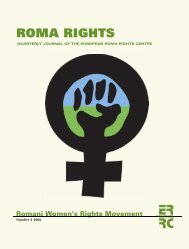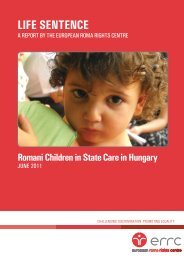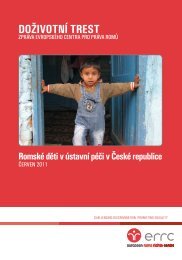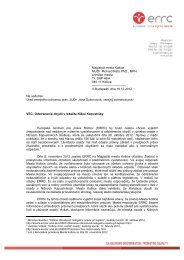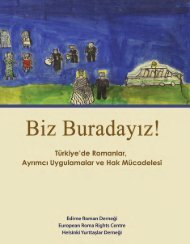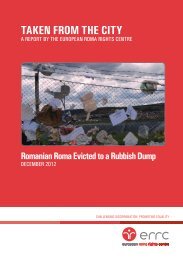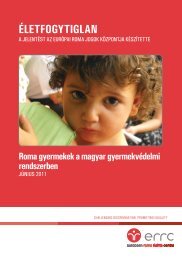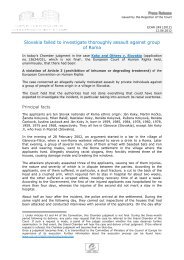security a la italiana sicurezza all'italiana securitate a la italiana
security a la italiana sicurezza all'italiana securitate a la italiana
security a la italiana sicurezza all'italiana securitate a la italiana
You also want an ePaper? Increase the reach of your titles
YUMPU automatically turns print PDFs into web optimized ePapers that Google loves.
34<br />
ITALY REPORT<br />
Coalition that recently when she took her sick children to the hospital, the authorities took<br />
away her baby, reportedly because the father was not present and because the police alleged that<br />
she had stolen something. Neither being a single parent (if Hasima had been) nor an alleged<br />
criminal are grounds for child removal in Italy. Hasima, whose husband is legally employed<br />
in Italy, had to file a comp<strong>la</strong>int to Italian courts before they were permitted to take their child<br />
home. During this time, their child spent 4 days in an orphanage. Hasima informed the<br />
Coalition that her case was not iso<strong>la</strong>ted, but that she was aware of numerous Roma in Mi<strong>la</strong>n<br />
who had experienced simi<strong>la</strong>r interferences in their private lives. 52<br />
Discriminatory Interferences by the State with the Right to<br />
Privacy and Home<br />
Aside from the abusive and discriminatory police raids of Romani homes highlighted<br />
previously in Section 4 of this report, members of the Coalition noted several other ways<br />
in which Italian officials discriminate against Roma in their daily lives.<br />
e most obvious and intrusive form of discrimination regarding the right to privacy and<br />
home was manifest in the p<strong>la</strong>cement of surveil<strong>la</strong>nce cameras throughout many of the formal<br />
Romani camps visited by the Coalition. For example, the Municipality of Roma finances<br />
the formal Camp Via Salone, a camp run on private property by an Italian association. e<br />
Romani inhabitants of the camp are originally from Romania. is camp is controlled by<br />
28 surveil<strong>la</strong>nce cameras which monitor every move made by the inhabitants. In Brescia, in<br />
Northern Italy, surveil<strong>la</strong>nce cameras were present in the formal Camp of Roma Italian Sinti.<br />
In Naples, surveil<strong>la</strong>nce cameras were also present in the camps visited by the Coalition.<br />
e Coalition questions the intention of the p<strong>la</strong>cement of surveil<strong>la</strong>nce cameras in Romani<br />
camps as well as whether such <strong>security</strong> systems are in p<strong>la</strong>ce in regu<strong>la</strong>r areas of state-financed<br />
social housing for non-Roma in Italy.<br />
During discussions about the situation of Roma living in Naples’ formal Centro Lima<br />
Camp, Coalition members noted that the 120 Romanian Romani inhabitants were treated<br />
as though they were living in a prison rather than in a state-provided living area. e camp’s<br />
Superintendent refused Coalition members entrance to the camp because they did not have<br />
formal permission from the “Civil Protection”. Aside from requiring formal permission to host<br />
visitors in their homes, Roma living in the camp are required to surrender their passports to the<br />
Camp’s Superintendent while they live there. In addition, the camp closes at 9:00 PM, after<br />
which time no one, including the residents, is allowed to either enter or leave the camp.<br />
52 Coalition interview with Ms Hasima, a Romani woman from Serbia. Mi<strong>la</strong>n, 25 May 2008.



